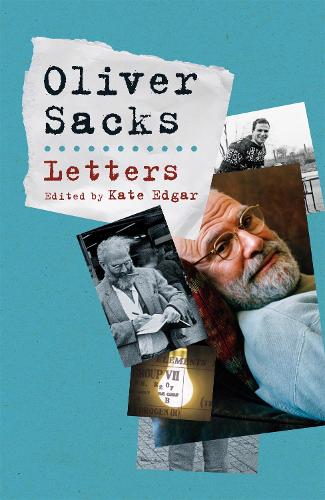
Letters
(Hardback)
Available Formats
Publishing Details
Letters
By (Author) Oliver Sacks
Pan Macmillan
Picador
25th March 2025
7th November 2024
United Kingdom
Classifications
General
Non Fiction
Autobiography: science, technology and medicine
616.80092
Physical Properties
Hardback
752
Width 164mm, Height 243mm, Spine 50mm
1002g
Description
'Oliver Sacks is a neurologist, a man of humane eloquence, and a genuine communicator' Observer Oliver Sacks, one of the great humanists of our age - who describes himself in these pages as a 'philosophical physician' and an 'astronomer of the inward' - wrote to an eclectic array of family and friends. Most were scientists, artists, and writers, even statesmen: Francis Crick, Antonio Damasio, Jane Goodall, W. H. Auden, Susan Sontag, Stephen Jay Gould, Bjrk, and his first cousin, Abba Eban. But many of the most eloquent letters in this collection are addressed to the ordinary people who wrote to him with their odd symptoms and questions, to whom he responds with a sense of generosity and wonder. With some correspondents, Sacks shares his struggle for recognition and acceptance both as a physician and as a gay man, providing intimate accounts as well of his passions for competitive weightlifting, motorcycles, botany, and music. With others, he chronicles his penchant for testing the boundaries of authority, the discovery of his writer's voice, and his explosive seasons of discovery with the patients who populate his book Awakenings. His descriptions of travels as a young man and the extraordinary people he encounters can be lyrical, ferocious, penetrating and hilarious. Many of his musings include the first detailed sketches of an essay forming in his mind, or miniature case histories rivalling those in his beloved essay collections. Sensitively selected and introduced by Kate Edgar, Sacks's longtime editor, the letters trace the arc of a remarkable life and reveal an often surprising portrait of Sacks as he wrestles with the workings of his own brain and mind. 'In addition to possessing the technical skills of a twentieth-century doctor, [Sacks] sees the human condition like a philosopher-poet' New York Times
Reviews
Here is the unedited Oliver Sacksstruggling, passionate, a furiously intelligent misfit. And also endless interesting. He was a man like no other -- Atul Gawande, author of Being Mortal
Here is Oliver Sacks annealed. All his largehearted curiosity, all his childlike wonder at how everything coheres, all the self-doubt trembling beneath his brilliance, come alive on these pages. One is left magnified just by bearing witness to this vast and solitary mind, searching for connection and discovering himself -- Maria Popova, author of Figuring
Oliver Sackss letters are superbfluent, brilliant, candid, intimateand some of them are deliriously passionate. Oliver could write a multi-page love letter as well as a lengthy analysis of a drug state or a neurological condition. Taken together, over more than fifty years, they constitute an autobiography in epistolary form -- Paul Theroux, author of The Mosquito Coast and Burma Sahib
Be prepared to discover a world of human treasures in the letters of Oliver Sacks . . . One marvel here is that Sacks literary genius manages to reveal both sides of a conversation, although we are only made privy to his perspective on the issues -- Antonio Damasio, author of Feeling and Knowing
Oliver Sacks is a neurologist, a man of humane eloquence, and a genuine communicator * Observer *
Sacks writes in the the great tradition of literary doctors. He is humane, relaxed and amused, and loved a good anecdote * The Spectator *
In addition to possessing the technical skills of a twentieth-century doctor, [Sacks] sees the human condition like a philosopher-poet * The New York Times *
Author Bio
Oliver Sacks was born in 1933 in London and was educated at Queen's College, Oxford. He completed his medical training at San Francisco's Mount Zion Hospital and at UCLA before moving to New York, where he soon encountered the patients whom he would write about in his book Awakenings. Dr Sacks spent almost fifty years working as a neurologist and wrote many books, including The Man Who Mistook His Wife For a Hat, Musicophilia, and Hallucinations, about the strange neurological predicaments and conditions of his patients. The New York Times referred to him as 'the poet laureate of medicine', and over the years he received many awards, including honours from the Guggenheim Foundation, the National Science Foundation, the American Academy of Arts and Letters, and the Royal College of Physicians. In 2008 he was appointed Commander of the British Empire. His memoir, On the Move, was published shortly before his death in August 2015.
